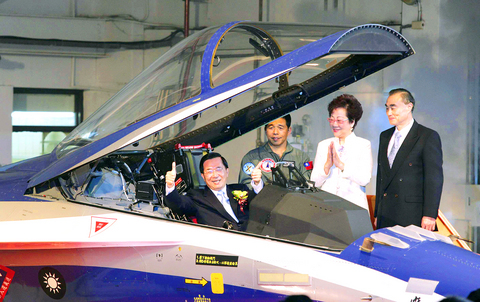The military unveiled an upgraded version of its locally produced indigenous defense fighter (IDF) warplane yesterday, to help boost the nation's defenses against China until Taipei can purchase more modern fighter planes from the West.
President Chen Shui-bian (陳水扁) presided over the ceremony yesterday at the Chingchuankang Airbase in Taichung.
Referring to the modified Indigenous Defense Fighter-II (IDF-II) "Hsiung Ying" (雄鷹, or "Goshawk"), Chen said he hoped the new model would protect the homeland with the ferocity of a Taiwan goshawk.

PHOTO: CHAN CHAO-YANG, TAIPEI TIMES
Chen watched a demonstration flight of two jets and later on inspected one on the ground. He praised the aircraft's development, but again urged the Legislative Yuan to hasten the approval of a billion-dollar arms budget to buy 12 P-3C anti-submarine aircraft, eight diesel submarines and six PAC-III anti-missile batteries from the US.
`A pity'
"It is a great pity that the three arms-purchase plans have not yet been passed by the legislature," he said. "National security should transcend party politics."
The Aerospace Industrial Development Corp (AIDC) spent NT$7 billion (US$200 million) and seven years upgrading the IDFs that it manufactured between 1981 and 1999, with help from the US.
The project was approved by the Chinese Nationalist Party (KMT) and the budgets were earmarked by the Democratic Progressive Party administration, beginning in 2001.
The IDF was named "Ching-kuo" (經國) after Chiang Ching-kuo (蔣經國), late president and son of dictator Chiang Kai-shek (蔣介石). It has been upgraded to improve its combat-capabilities against Chinese forces.
Modifications
The modifications included improving the jet's flight control system and cockpit, enlarging the fuel tanks and equipping the planes with the capacity to carry air-to-air missiles and anti-radiation missiles.
The Air Force's fleet now consists of 130 IDFs, 150 US-made F-16A/Bs and 60 French-built Mirage 2000-5s. Taiwan is also seeking to buy 66 F-16C/Ds.
Vice President Annette Lu (呂秀蓮), who accompanied Chen to the test flight and naming ceremony at the AIDC in Taichung County yesterday morning, mistakenly referred to the new model as the "Taiwan bald eagle."
Noticing her blunder, the vice president then corrected herself and said that the right name, Hsiung Ying, was the combination of "Ying Hsiung" (英雄, hero) and "goshawk" (蒼鷹).
Saying that government policies should continue regardless of which party is in power, Chen yesterday urged opposition parties to stop letting politics get in the way of the passage of government budgets and bills in the legislature because of upcoming elections.
"I hereby call on the opposition parties to refrain from hindering the government from serving the nation," he said. "I also hope that Legislative Speaker Wang Jin-pyng (王金平) can use his political influence to help pass the government budget as well as bills for the benefit of the people and the country."
Jeopardy
"It is beyond comprehension that in a normal democracy, government budgets are still bogged down in the legislature at the end of March," he said. "As long as the budget doesn't pass the legislature, national development and the welfare of the people will be in grave jeopardy."
Citing the example of the IDF upgrade project, Chen said that his administration did not overturn the project nor discount the budgets, even though the project had been approved by the former administration.

Taiwan yesterday denied Chinese allegations that its military was behind a cyberattack on a technology company in Guangzhou, after city authorities issued warrants for 20 suspects. The Guangzhou Municipal Public Security Bureau earlier yesterday issued warrants for 20 people it identified as members of the Information, Communications and Electronic Force Command (ICEFCOM). The bureau alleged they were behind a May 20 cyberattack targeting the backend system of a self-service facility at the company. “ICEFCOM, under Taiwan’s ruling Democratic Progressive Party, directed the illegal attack,” the warrant says. The bureau placed a bounty of 10,000 yuan (US$1,392) on each of the 20 people named in

The High Court yesterday found a New Taipei City woman guilty of charges related to helping Beijing secure surrender agreements from military service members. Lee Huei-hsin (李慧馨) was sentenced to six years and eight months in prison for breaching the National Security Act (國家安全法), making illegal compacts with government employees and bribery, the court said. The verdict is final. Lee, the manager of a temple in the city’s Lujhou District (蘆洲), was accused of arranging for eight service members to make surrender pledges to the Chinese People’s Liberation Army in exchange for money, the court said. The pledges, which required them to provide identification

Nine retired generals from Taiwan, Japan and the US have been invited to participate in a tabletop exercise hosted by the Taipei School of Economics and Political Science Foundation tomorrow and Wednesday that simulates a potential Chinese invasion of Taiwan in 2030, the foundation said yesterday. The five retired Taiwanese generals would include retired admiral Lee Hsi-min (李喜明), joined by retired US Navy admiral Michael Mullen and former chief of staff of the Japan Self-Defense Forces general Shigeru Iwasaki, it said. The simulation aims to offer strategic insights into regional security and peace in the Taiwan Strait, it added. Foundation chair Huang Huang-hsiung

’DISTORTION’: Beijing’s assertion that the US agreed with its position on Taiwan is a recurring tactic it uses to falsely reinforce its sovereignty claims, MOFA said The Ministry of Foreign Affairs (MOFA) yesterday said Chinese state media deliberately distorted Taiwan’s sovereign status, following reports that US President Donald Trump agreed to uphold the “one China” policy in a phone call with Chinese President Xi Jinping (習近平). During the more than one-hour-long call, Xi urged Trump to retreat from trade measures that roiled the global economy and cautioned him against threatening steps on Taiwan, a Chinese government summary of the call said. China’s official Xinhua news agency quoted Xi as saying that the US should handle the Taiwan issue cautiously and avoid the two countries being drawn into dangerous